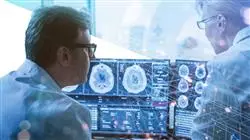University certificate
The world's largest faculty of medicine”
Introduction to the Program
Join this 100% online program where you will delve into Machine Learning Algorithms and their applications in Medical Research”

Machine Learning Algorithms play a key role in establishing personalized and effective therapeutic treatments. This set of computer-defined instructions uses clinical as well as biomedical or genetic data to develop predictive models. In this way, clinicians apply personalized therapies and can predict responses to therapies so that they have a higher probability of success. In addition, these tools can also accurately calculate drug doses, improving the efficacy of the approaches.
In this context, TECHwill implement an advanced program that will delve into the use of Artificial Intelligence during the planning and execution of medical procedures. Under the guidance of a well-versed faculty, this syllabus will analyze pattern recognition and Machine Learning in clinical diagnostics. Therefore, specialists will correctly interpret medical images to provide the most appropriate treatments for each individual. The syllabus will also provide comprehensive skills on the most innovative therapeutic protocols. In this line, the didactic materials will offer the latest advances in assisted surgical robotics so that graduates will remain at the technological forefront.
On the other hand, the program's methodology will reflect the need for flexibility and adaptation to contemporary professional demands.
With a 100% online format, it will allow graduates to advance in their education without compromising their job responsibilities. In addition, the application of the Relearning system, based on the reiteration of key concepts, ensures a deep and lasting understanding. This pedagogical approach reinforces the professionals' ability to effectively apply the knowledge acquired in their daily practice. In turn, the only thing doctors will need to complete this academic itinerary will be a device with Internet access and the determination to update their knowledge that will allow them to experience a leap in quality in their careers.
You will apply Artificial Intelligence to respond to health emergencies such as epidemiological outbreaks and in the development of new vaccines”
This Postgraduate diploma in Diagnosis, Treatment and Personalization of Medical Treatment with Artificial Intelligence contains the most complete and up-to-date scientific program on the market. Its most notable features are:
- The development of case studies presented by experts in Artificial Intelligence in Clinical Practice
- The graphic, schematic and eminently practical contents with which it is conceived gather scientific and practical information on those disciplines that are indispensable for professional practice
- Practical exercises where self-assessment can be used to improve learning
- Its special emphasis on innovative methodologies
- Theoretical lessons, questions to the expert, debate forums on controversial topics, and individual reflection assignments
- Content that is accessible from any fixed or portable device with an Internet connection
You will foster patient autonomy through active participation in the design of personalized treatments following the study of this program”
The program’s teaching staff includes professionals from the sector who contribute their work experience to this specializing program, as well as renowned specialists from leading societies and prestigious universities.
The multimedia content, developed with the latest educational technology, will provide the professional with situated and contextual learning, i.e., a simulated environment that will provide immersive education programmed to learn in real situations.
This program is designed around Problem-Based Learning, whereby the professional must try to solve the different professional practice situations that arise during the course. For this purpose, students will be assisted by an innovative interactive video system created by renowned and experienced experts.
Thanks to TECH, you will be able to perform multimodal clinical data integrations for more accurate diagnoses”

You will update your key knowledge through the innovative Relearning methodology for an effective assimilation of the subject”
Why study at TECH?
TECH is the world’s largest online university. With an impressive catalog of more than 14,000 university programs available in 11 languages, it is positioned as a leader in employability, with a 99% job placement rate. In addition, it relies on an enormous faculty of more than 6,000 professors of the highest international renown.

Study at the world's largest online university and guarantee your professional success. The future starts at TECH”
The world’s best online university according to FORBES
The prestigious Forbes magazine, specialized in business and finance, has highlighted TECH as “the world's best online university” This is what they have recently stated in an article in their digital edition in which they echo the success story of this institution, “thanks to the academic offer it provides, the selection of its teaching staff, and an innovative learning method aimed at educating the professionals of the future”
A revolutionary study method, a cutting-edge faculty and a practical focus: the key to TECH's success.
The most complete study plans on the university scene
TECH offers the most complete study plans on the university scene, with syllabuses that cover fundamental concepts and, at the same time, the main scientific advances in their specific scientific areas. In addition, these programs are continuously being updated to guarantee students the academic vanguard and the most in-demand professional skills. In this way, the university's qualifications provide its graduates with a significant advantage to propel their careers to success.
TECH offers the most comprehensive and intensive study plans on the current university scene.
A world-class teaching staff
TECH's teaching staff is made up of more than 6,000 professors with the highest international recognition. Professors, researchers and top executives of multinational companies, including Isaiah Covington, performance coach of the Boston Celtics; Magda Romanska, principal investigator at Harvard MetaLAB; Ignacio Wistumba, chairman of the department of translational molecular pathology at MD Anderson Cancer Center; and D.W. Pine, creative director of TIME magazine, among others.
Internationally renowned experts, specialized in different branches of Health, Technology, Communication and Business, form part of the TECH faculty.
A unique learning method
TECH is the first university to use Relearning in all its programs. It is the best online learning methodology, accredited with international teaching quality certifications, provided by prestigious educational agencies. In addition, this disruptive educational model is complemented with the “Case Method”, thereby setting up a unique online teaching strategy. Innovative teaching resources are also implemented, including detailed videos, infographics and interactive summaries.
TECH combines Relearning and the Case Method in all its university programs to guarantee excellent theoretical and practical learning, studying whenever and wherever you want.
The world's largest online university
TECH is the world’s largest online university. We are the largest educational institution, with the best and widest online educational catalog, one hundred percent online and covering the vast majority of areas of knowledge. We offer a large selection of our own degrees and accredited online undergraduate and postgraduate degrees. In total, more than 14,000 university degrees, in eleven different languages, make us the largest educational largest in the world.
TECH has the world's most extensive catalog of academic and official programs, available in more than 11 languages.
Google Premier Partner
The American technology giant has awarded TECH the Google Google Premier Partner badge. This award, which is only available to 3% of the world's companies, highlights the efficient, flexible and tailored experience that this university provides to students. The recognition as a Google Premier Partner not only accredits the maximum rigor, performance and investment in TECH's digital infrastructures, but also places this university as one of the world's leading technology companies.
Google has positioned TECH in the top 3% of the world's most important technology companies by awarding it its Google Premier Partner badge.
The official online university of the NBA
TECH is the official online university of the NBA. Thanks to our agreement with the biggest league in basketball, we offer our students exclusive university programs, as well as a wide variety of educational resources focused on the business of the league and other areas of the sports industry. Each program is made up of a uniquely designed syllabus and features exceptional guest hosts: professionals with a distinguished sports background who will offer their expertise on the most relevant topics.
TECH has been selected by the NBA, the world's top basketball league, as its official online university.
The top-rated university by its students
Students have positioned TECH as the world's top-rated university on the main review websites, with a highest rating of 4.9 out of 5, obtained from more than 1,000 reviews. These results consolidate TECH as the benchmark university institution at an international level, reflecting the excellence and positive impact of its educational model.” reflecting the excellence and positive impact of its educational model.”
TECH is the world’s top-rated university by its students.
Leaders in employability
TECH has managed to become the leading university in employability. 99% of its students obtain jobs in the academic field they have studied, within one year of completing any of the university's programs. A similar number achieve immediate career enhancement. All this thanks to a study methodology that bases its effectiveness on the acquisition of practical skills, which are absolutely necessary for professional development.
99% of TECH graduates find a job within a year of completing their studies.
Postgraduate Diploma in Diagnosis, Treatment and Personalization of Medical Treatment with Artificial Intelligence
At the crossroads of medicine and technological innovation, Artificial Intelligence (AI) emerges as a beacon of revolutionary possibilities in the diagnosis, treatment and personalization of medical care. Would you like to specialize in this field? TECH Global University has the ideal option for you: the Postgraduate Diploma in Diagnosis, Treatment and Personalization of Medical Treatment with AI. The program, taught in online mode, is designed to take your understanding of medical care to new levels, effectively integrating AI to drive accuracy and personalization at every step of the process. Start your journey with an immersion into the fundamentals of AI-assisted diagnosis. You'll learn how to interpret medical images, analyze clinical data and use advanced algorithms to achieve more accurate and faster diagnoses. Likewise, you'll explore how AI can transform medical treatment selection. From identifying potential therapies, to optimizing protocols, this course will equip you with practical skills to improve the efficacy of medical treatments.
Get your degree from the world's largest online medical school
Discover the convergence of medicine and technology with our innovative university diploma. Prepare to lead the revolution in healthcare with specialized skills in diagnosis, treatment and personalization of medical treatment with AI. As you progress through the program, you'll dive into the exciting world of treatment personalization. You'll learn how to use AI to tailor therapies and procedures based on individual patient characteristics, opening the door to more precise, person-centered medical care. In addition, you will address crucial ethical issues related to the application of AI in healthcare, from patient privacy, to autonomous decision making, this module will guide you in the ethical management of technology in a medical setting. Finally, you will discover how AI integrates with emerging technologies to deliver more accessible and efficient healthcare (wearables and telemedicine systems). Join us and take the next step towards the medicine of the future. Your path to mastery in personalized medicine starts here - enroll now!







